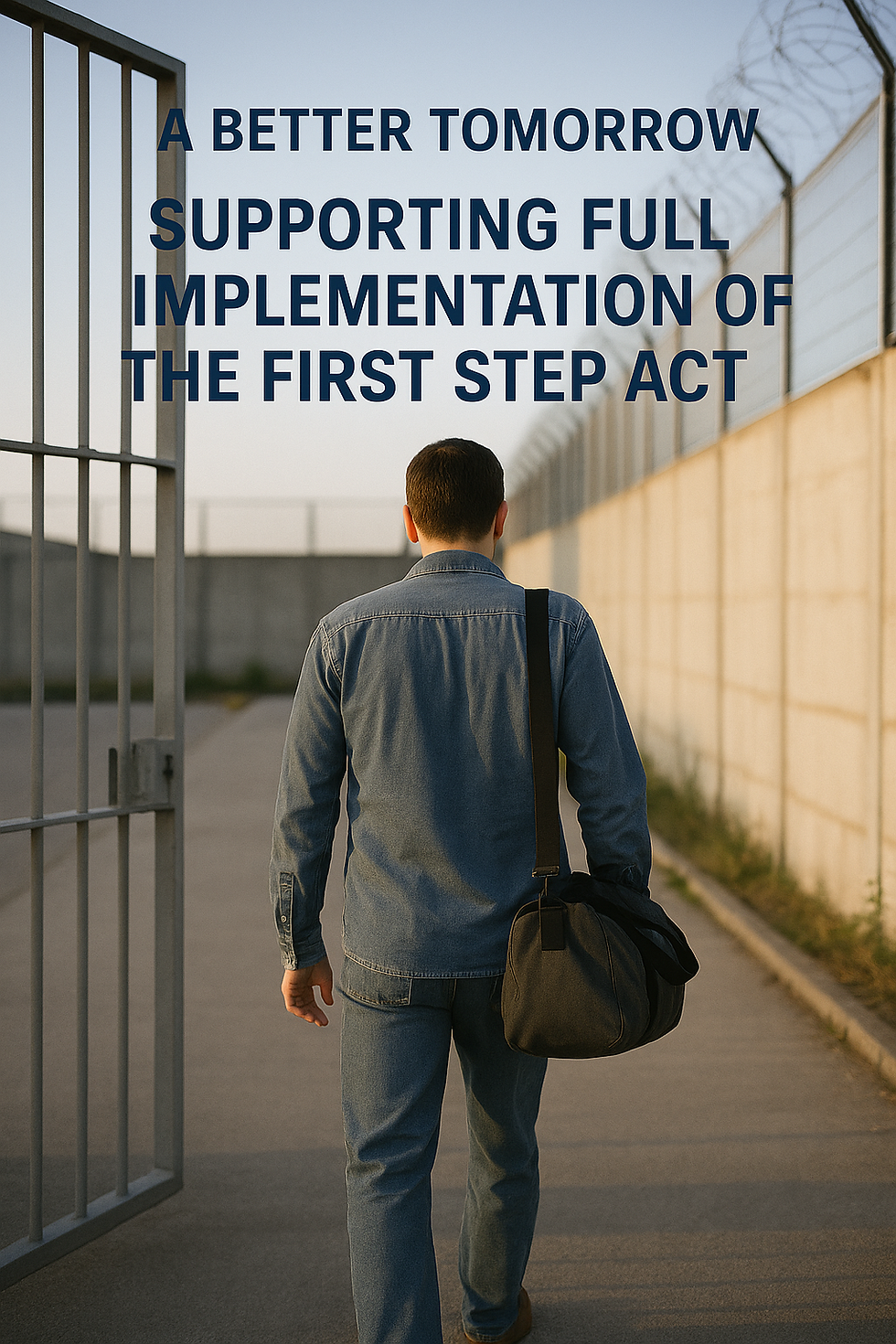A Better Tomorrow: Supporting Full Implementation of the First Step Act
- Bob Jesenik

- Sep 14, 2025
- 4 min read

At A Better Tomorrow (ABT), we’re hopeful that newly appointed Bureau of Prisons (BOP) Director Billy Williams III and Assistant Director Joshua Smith will successfully lead a true transformation of the BOP — with the full support and guidance of Attorney General Pam Bondi.
As ABT recently reported, Director Williams has already taken major steps toward full-scale implementation of the First Step Act (FSA) across wardens and their staff nationwide.
A New Direction Under Director Williams and Attorney General Bondi
Many incarcerated individuals are encouraged that Attorney General Bondi and Director Williams have made it a top priority for BOP staff to fully implement the FSA — particularly by combining the benefits of the Second Chance Act (SCA) with FSA time credits and emphasizing home confinement where appropriate.
In internal memos reviewed by ABT, the Director has made it clear: the days of delaying transitions to pre-release custody with excuses like “no bed space in halfway houses” are over.
This renewed commitment shows a shift toward accountability and genuine rehabilitation — and we at ABT applaud it.
The Next Big Fix: Applying FSA Credits Earned During Pre-Custody
Our hope is that Director Williams will now tackle the next major reform: fixing the BOP’s policy of denying the use of FSA credits earned during pre-custody, such as while in halfway houses or on home confinement.
In my own case, that means 19 months of time credits against a 14-year sentence — far from insignificant. Yet, under current BOP policy, those credits are effectively treated as worthless.
The BOP’s Contradictory Approach
Here’s how the BOP justifies its stance:
Acknowledgement: The BOP and federal courts agree that under 18 U.S.C. § 3632(d)(4)(A), time credits can be earned during the pre-custody phase.
Contradiction: The BOP then relies on § 3624(g) to argue that all credits must be earned before entering pre-custody — directly contradicting its own Program Statement 7310.04 (“CCC Utilization and Transfer Procedure”), which makes clear that § 3624(g) does not limit transfers to pre-custody at any time.
In practice, this means that while offenders earn credits during pre-custody, the BOP refuses to apply them toward early release or supervised release reductions — claiming they’re “worth nothing.”
A Turning Point: Gonzalez v. Herrera (9th Cir. 2025)
Thankfully, the Ninth Circuit Court of Appeals disagreed with the BOP’s interpretation in Leon Abel Gonzalez v. Juan Herrera, BOP Residential Reentry Manager, WL 2396495 (9th Cir. Aug. 25, 2025).
The Court ruled that under § 3632(d)(4)(C),
“Time credits earned by prisoners who successfully participate in recidivism-reduction programs or productive activities will be applied toward time in pre-release custody or supervised release.”
This means earned credits must be applied — not discarded.
What the Ruling Means
If followed, this decision compels the BOP to do one of the following:
Accelerate pre-custody start dates by accounting for projected credits earned during pre-custody.
Shorten supervised release terms for time credits earned but not applied during pre-custody.
Use a combination of both approaches.
Currently, an estimated 10,000–20,000 inmates in pre-custody are earning credits that the BOP treats as valueless. Thousands more in supervised release could also benefit from retroactive application of these credits. Including those waiting for halfway house placement, this issue may affect over 50,000 people nationwide.
How to Take Action
To ensure full FSA implementation and compliance with the Ninth Circuit’s ruling, we encourage the following steps:
Contact DOJ leadership — Write or email Attorney General Pam Bondi and Director Billy Williams III urging them to:
Amend BOP Program Statements to allow pre-custody credits to apply toward both earlier pre-custody dates and reduced supervised release periods.
Update inmate FSA Time Credit Assessment worksheets to include projected credits earned during pre-custody and how they will be applied.
Contact your members of Congress — Ask your U.S. Representative or Senator to support legislation clarifying that § 3624(g) does not bar the use of projected pre-custody credits for earlier release or shorter supervision terms.
File an Administrative Remedy — Inmates currently in pre-custody or on supervised release can file under the BOP Administrative Remedy Program seeking recalculation or application of earned credits. If denied, consider filing a § 2241 habeas petition to challenge the policy and expand case law supporting full FSA enforcement.
Spread awareness — Share this information with other reform advocates, reentry organizations, media outlets, and podcasts. The more public awareness, the greater the pressure on the BOP to comply.
A Path Forward
As the Ninth Circuit noted:
“If earned time credits could reduce time in imprisonment, pre-release custody, or supervised release, their incentive value is maximized. That is the interpretation that best serves the purposes of the statute.”
We at A Better Tomorrow remain hopeful that the DOJ and BOP leadership will honor both the law and the spirit of reform — ensuring that every participant in rehabilitation programs receives the full benefit Congress intended.
We’ll continue monitoring developments and sharing updates. In the meantime, we urge everyone impacted to take action — and help make the promise of the First Step Act a reality for all.
Sources
Leon Abel Gonzalez v. Juan Herrera, WL 2396495 (9th Cir. Aug. 25, 2025).
Bureau of Prisons Program Statement 7310.04, “CCC Utilization and Transfer Procedure.”
18 U.S.C. §§ 3632(d)(4), 3624(g).
A Better Tomorrow internal review of BOP staff memoranda, 2025.





Comments